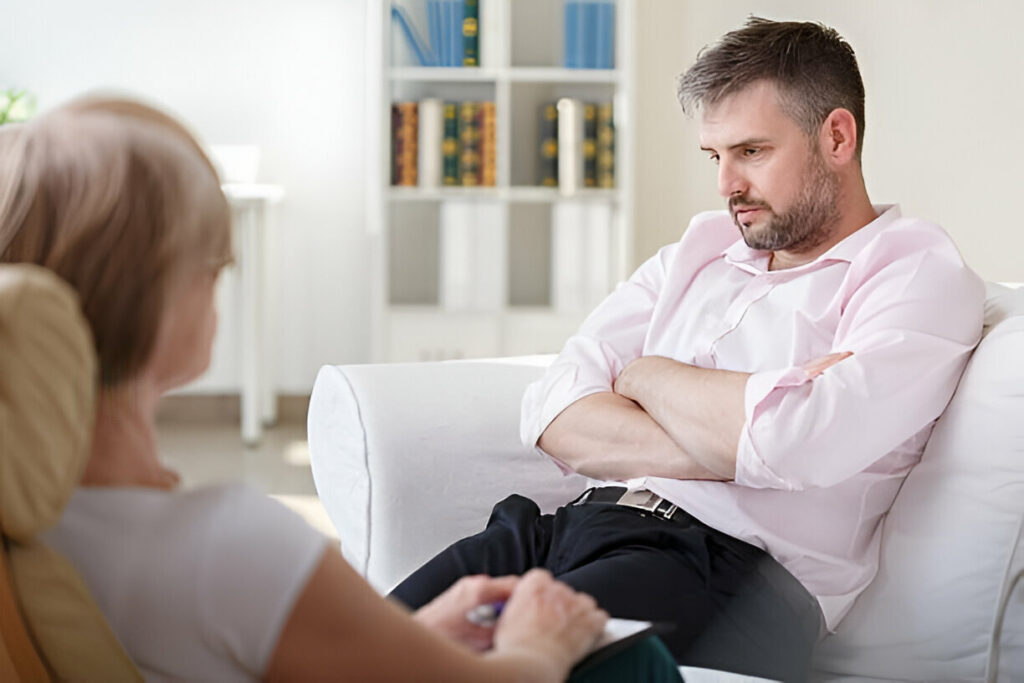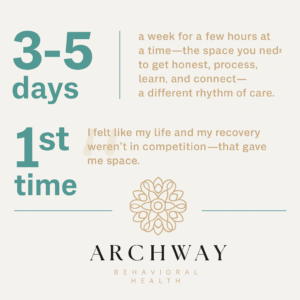It Wasn’t You. It Was the Fit.
Leaving treatment can feel like walking out of a promise you made to yourself. Whether you ghosted mid-program or just never made it past week two, the shame can hit hard. But here’s the thing—falling off the map doesn’t mean you’re a failure. It might mean something wasn’t working for you. Not because you’re broken, but because healing doesn’t follow a script.
That’s where an intensive outpatient program comes in. It’s not a punishment or a second-tier option. It’s a different rhythm of care—one that respects your reality, your time, and your truth.
IOP Isn’t “Less Than.” It’s Just Built Differently.
There’s this hierarchy in treatment that no one says out loud—but you feel it. The sense that if you’re not in residential or partial hospitalization, you must not be trying hard enough. That if you need flexibility, you’re “opting out.”
That’s false. An intensive outpatient program is about intentional support that still lets you live your life. At Archway Behavioral Health in Boca Raton, our IOP clients come in for 3–5 days a week, for a few hours at a time. That’s enough space to get honest, process, learn, and connect—without blowing up your whole life to do it.
You’re not stepping down. You’re stepping in.
If You Ghosted Treatment, This Part’s For You
Maybe you stopped replying. Maybe you told yourself you’d call back tomorrow and weeks passed. Maybe it felt too late to return without having to explain yourself.
You don’t owe us a story to come back. At Archway, we know that silence usually means struggle—not disinterest. We don’t ask, “Why did you leave?” We ask, “What do you need now?”
If you’re looking for an intensive outpatient program in Parkland, Florida or the surrounding areas, we’re close by. And we don’t close the door behind you when you leave—we leave it open.
What IOP Gave Me That Higher Levels of Care Didn’t
In higher-acuity treatment, I learned skills. But in IOP, I practiced them.
That shift matters. In an IOP setting, you’re not just talking about boundaries—you’re setting one with your boss. You’re not just exploring triggers—you’re walking into a real-world one and bringing the experience back to process. You get real-time feedback from your life, not just your therapist.
For me, it was the first time I felt like my life and my recovery weren’t in competition. That gave me space to grow. Not just behave.
Still Using? That Doesn’t Disqualify You
Let’s say the truth out loud: some people read blogs like this with a joint in hand or a half-finished drink next to them. And that’s okay.
You don’t need to be clean to want change. You don’t need to have it all together to reach out. If there’s even a small part of you wondering if something different is possible—that part is enough.
You don’t have to quit alone just to “deserve” help. You get to be messy. You get to be unsure. You get to start from wherever you are.
What IOP Actually Looks Like at Archway
If you’re picturing folding chairs and forced vulnerability, hit pause. Our Intensive Outpatient Program combines group therapy, individual sessions, skills training, and experiential approaches like mindfulness, psychoeducation, and relapse prevention work.
You’ll connect with other people navigating the same gray zone—people who’ve tried before. People who left and came back. People who thought they were done changing, only to find out they had another layer to face.
Whether you’re in Boca Raton or seeking support in Highland Beach, Florida, you’re not far from a place where you can reset without starting over.
You Don’t Need to Earn Another Chance
Somewhere along the way, you may have started believing that recovery is a test you pass—or fail. That if you ghosted treatment, you flunked.
That belief keeps people stuck.
At Archway, we see you as a whole person, not a failed attempt. The fact that you’re still seeking, still curious, still hurting—that’s enough. We don’t need perfect attendance. We just need you to show up today.
FAQ: Intensive Outpatient Programs for Returning Clients
What if I’ve been to IOP before and it didn’t help?
Treatment isn’t one-size-fits-all. What didn’t work before might work now—especially with the right setting, therapist match, and timing. Many clients return to IOP later and finally feel things click.
Do I need to detox before starting IOP?
It depends on your substance use. Some clients benefit from a short detox period before beginning IOP, especially if physical withdrawal is likely. Others can begin IOP while tapering or stabilizing. Our team will assess your needs gently and clearly—no pressure, just honesty.
Can I go back to IOP if I left without notice?
Yes. You’re always welcome to return. We don’t require an explanation, and we won’t hold your absence against you. The focus is on now—not what happened before.
How flexible is the IOP schedule?
IOP at Archway typically runs several hours a day, three to five days a week. We offer some flexibility with scheduling to help you integrate care into your life—especially if you’re working or managing other obligations.
Is IOP just therapy groups? What else happens?
While group therapy is central, IOP includes a mix of modalities: individual sessions, skills classes, psychoeducation, relapse prevention, mindfulness, and more. It’s structured to help you build practical, repeatable tools.
A Word If You’re Still On the Fence
If you’re still reading, maybe you’re wondering if this even applies to you. Maybe you’re not sure you qualify, or you’re afraid of what it means to come back.
But maybe—just maybe—you know that something in your life isn’t working. You don’t have to fix it all today. You don’t have to explain why it got this way. You just have to take the next right step.
And if that step is calling, or even just clicking to read a little more, we’ll be here.
📞 Ready to Talk?
Call (888) 530-0227 to learn more about our intensive outpatient program services in Boca Raton, Florida.



